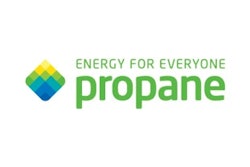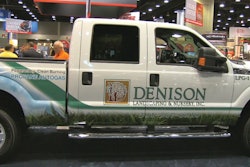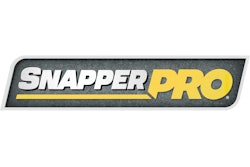The more widespread availability of propane-powered lawn mowers is one reason they are becoming more commonplace in a landscape contractor’s mowing fleet. The two biggest reasons, though, are the environmental benefits and potential cost savings, especially for large lawn mowing operations.
“Three years ago, only two manufacturers produced propane-fueled commercial lawn mowers,” says Brian Feehan, vice president of the Propane Education & Research Council (PERC). “Today there are more than 29 propane-fueled commercial lawn mower models available from industry-leading brands (see sidebar). The sheer availability of a more diversified product offering has built interest, which was evidenced by attendees inquiring about propane-fueled mowers at the GIE+EXPO last October.”
Reduced Operating Costs
Feehan says interest has grown primarily because landscape companies are realizing that propane-fueled mowers can reduce their operating costs. Sean Dwyer, Husqvarna’s global product manager for zero-turn mowers and specialty turf products, tends to agree, explaining that Husqvarna’s initial reason for introducing a propane-fueled zero-turn mower was driven by the desire to offer an environmentally friendly option.
“But we quickly saw that there were definite benefits to large fleet operators,” Dwyer relates. Those benefits include lower overall cost to operate, reduced maintenance due to stale fuel (gas), and potentially longer engine life.
Feehan says that, when calculating total operating costs, landscape contractors are finding cost-savings in several additional ways:
- Virtually eliminating fuel spillage
- Virtually eliminating fuel leakage
- Virtually eliminating fuel theft
Ivan Giraldo, president of Clean Scapes in Austin, TX, says that one of the main reasons his company switched over to propane mowers a couple of years go has to do with engine performance.
“Propane has allowed us to cut maintenance costs (oil changes) while allowing the engines to operate much cleaner,” adds Robert Ortiz, fleet manager at Clean Scapes. “With less carbon deposits in the engine, we have fewer problems with a mower’s service life. Propane is approximately 110 octane or higher, which improves performance for the long run.” More than half of Clean Scapes’ mowers, which include both zero-turn riders and walk-behinds, are propane-fueled.
The price of propane alone may be enough to sway some contractors’ opinions. “Choosing propane isn’t just about emissions,” says Allen Baird, Cub Cadet Commercial product manager. “It’s also about savings, as liquid propane generally costs one-third less than gas or diesel fuel.”
With analysts predicting $100-a-barrel oil again this year, helping push gas prices to well over $3 a gallon, one must wonder if lawn maintenance contractors who are already struggling to prevent further profit margin erosion will clamor to propane-fueled mowing options. Time will tell.
In the meantime, Scag Power Equipment is one commercial mower manufacturer that’s covering its bases. Its Dual-Fuel Turf Tiger, which can run on either gasoline or propane, gives operators the flexibility to burn whichever fuel is cheaper at the moment. Operators can quickly switch between gas and propane with the simple flip of a switch, even while the engine is running.
Environmental Benefits
According to Chris Frame, Scag’s director of marketing and technical services, the Dual-Fuel Turf Tiger has gained popularity in areas of the country that have ozone action days, which limit the use of gas-powered lawn mowers when weather conditions run the risk of causing health problems. If the contractor is facing an ozone action day, he can flip the switch and burn propane. When the ozone action day expires, he can switch back to gasoline if he chooses.
“Propane-fueled mowers reduce greenhouse gas emissions by almost 50% compared to gasoline,” Feehan says. “There is also an 80% reduction in carbon monoxide when compared to gasoline.”
“With more and more governmental incentives promoting the use of ‘green’ alternatives, we recognize that propane-powered equipment represents a new option in clean and efficient solutions to lawn and grounds care,” Baird adds. “Propane offers the same high-performance benefits of both gasoline and diesel.”
Productivity
The PERC is finding that landscape contractors who continually seek more cost-effective ways to operate and are looking for a competitive point of differentiation are the ones incorporating propane-fueled mowers into their fleets. Frame says he’s seeing the majority of sales go to landscapers with a bent toward sustainability. Dwyer views the typical contractor as one with a fairly large operation of at least 10 mowers; that’s when an on-site propane tank filling station is more feasible and accruing fuel cost savings have a significant impact on the bottom line.
Down in Austin, TX, Clean Scapes is a large multi-million-dollar commercial maintenance company. Ortiz says crews have experienced gains in productivity. “Due to the size of the propane cylinders, our mowers can run from three to six hours per single fill,” he points out. “Some crews have dual-cylinder mowers, allowing for even longer run times. Naturally, there are variables due to terrain and vegetation. But I can definitely say that crews have longer run times due to using propane.”
Dwyer says propane-fueled mowers, generally speaking, perform on par with their gasoline-powered counterparts. “Unless the mower is engaged in very heavy cutting, it’s hard to tell the difference,” Dwyer says.
Feehan points out that propane availability is an important consideration for the busy landscape contractor. “The established forklift refueling infrastructure is the same business model that is being directly applied to the commercial mower market,” he explains. “There are more than 600,000 propane-fueled forklifts in operation every day, and propane is provided to meet just-in-time inventory as often as needed, either through cylinder exchange or on-site refueling.”
Government Incentives
Additionally, PERC’s partnership with states program is a demonstration program offered with state propane gas associations to help end-users offset incremental costs for purchasing propane-fueled equipment, along with supporting safety and training initiatives.
The Commercial Mower Purchase/Placement Data Collection program model encourages increased understanding and support for recently commercialized propane-fueled, off-road equipment such as commercial mowers and aftermarket engine-conversion equipment. A dollar-for-dollar match of up to $2,500 can be accessed via participating state propane gas associations for the purchase of a new propane-fueled mower. Matching funds of up to $1,500 can be secured for conversion of existing commercial mower products. In exchange for funding, the program requires applicants to provide quarterly data reports for one year on the new equipment purchase, including performance characteristics, hours of use, and gallons of propane fuel used.
Propane-Fueled Commercial Mower Manufacturers
According to the Propane Education & Research Council, the following commercial lawn mower manufacturers offer propane-fueled models:
Ariens/Gravely: The Pro-Master 260H LP XDZ zero-turn mower features a 28-hp/992cc Generac LP engine.
Bad Boy: The Propane Series zero-turn mower uses a Briggs & Stratton 895cc/32-hp Vanguard V-twin engine allowing for an 80% emissions reduction.
Cub Cadet Commercial: The Tank S LP zero-turn mower utilizes an 852cc or 999cc Kawasaki engine. The Z-Force S LP features a 726cc Kawasaki FR Series V-twin engine.
Dixie Chopper: The Xcaliber Propane zero-turn mower is fueled by two 40-pound propane cylinders and a 990cc Generac LP engine.
Exmark: The Lazer Z Advantage Series zero-turn mower is powered by a 28-hp Kawasaki V-twin engine. Also available are the Turf Tracer and Turf Tracer HP propane-fueled walk-behind mowers.
Ferris Industries: The IS 3100Z zero-turn mower features an 895cc Briggs & Stratton Vanguard Big Block V-twin engine with vapor-draw fuel tanks.
Husqvarna: The PZ6029PFX zero-turn mower uses a Kawasaki FX Series 29-hp/852cc engine. Optional 33-pound tanks hold about 14 gallons of propane, allowing all-day operation.
Scag Power Equipment: The zero-turn Dual-Fuel Turf Tiger is a dual-fuel-powered commercial mower, offering both liquid propane fuel and gasoline operation. An optional propane-only conversion kit allows it to conform to local regulations, while the mower is also available with a Kohler propane-specific engine.
Schiller Grounds Care: The BOB-CAT Predator-Pro LP zero-turn mower uses a 30-hp Generac engine designed to take advantage of propane’s higher octane level.
Snapper Pro: The S200xp zero-turn mower features an 895cc Briggs & Stratton Vanguard Big Block V-twin engine, offering up to 30% reduced emissions.
Zipper Mower: The front-mount Model STS-28LP uses a Kawasaki 28-hp air-cooled OHV engine.


![Doosan Bobcat Wacker Neuson Stack 2ec Js Pb V6e[1]](https://img.greenindustrypros.com/mindful/acbm/workspaces/default/uploads/2025/12/doosan-bobcat-wacker-neuson-stack2ecjspbv6e1.CPyyz8ubHn.png?auto=format%2Ccompress&bg=fff&fill-color=fff&fit=fill&h=100&q=70&w=100)







![Doosan Bobcat Wacker Neuson Stack 2ec Js Pb V6e[1]](https://img.greenindustrypros.com/mindful/acbm/workspaces/default/uploads/2025/12/doosan-bobcat-wacker-neuson-stack2ecjspbv6e1.CPyyz8ubHn.png?ar=16%3A9&auto=format%2Ccompress&bg=fff&fill-color=fff&fit=fill&h=135&q=70&w=240)








